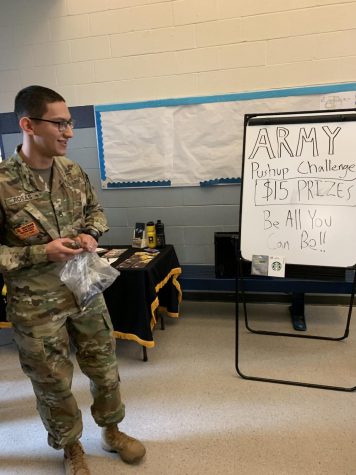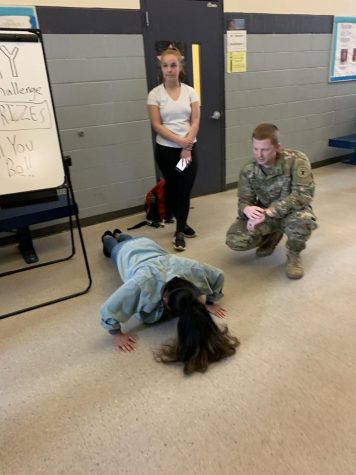Military Recruiting: Providing Pathways or Just Being Pushy?
April 20, 2019
Walking through Gresham High School you can see military advertising, if you’re a student here you may notice military recruiters on our school almost every Tuesday and Thursday. Occasionally the recruiters have competitions with prizes like a “push up challenge” or a “pull up challenge”.
“Keep in mind that recruiters are there to recruit, it’s their job title, just like salesmen are there to sell. So I would say, as someone who is talking to the recruiter, to take everything with a grain of salt, be skeptical do your own research, because they are trying to give you information, but they have a bias,” military veteran and ELL teacher, Wendy Armstrong said.
But what’s the appropriate level of being able to take things with “a grain of salt” at ages 14-18? The same students who often forget to turn in reading logs and don’t know how to compose an email on their own are being told to join the military to potentially fight in a war.
Although many may defend this by saying there are other options in the military than going into direct combat, this is most likely not the first thing the student is thinking of when signing up. Military recruiters often don’t emphasize all the other options the military might be able to offer the students.
“The coast guard needs to come too if they’re going to put all the other promotions in the school to kill people and stuff there needs to be coast guard promotion because they do drug busts and clean buoys. The coast guard is super cool but no one ever talks about it at Gresham” Henry Sweeney, a former student at Gresham High said.
College and military recruiters host information sessions at the career and college center on campus to entice students to learn more about the options for their future. However, the stakes are not nearly as high when signing up for college as compared to the military. If you are active duty, reserve, or in any other military role that places you in a war zone, your life could be at risk. If you go to college and things go poorly you may have wasted money but at least you are still alive.

Military tries to recruit individuals via a challenge.
At Gresham High School, there are many more visual reminders that the military is an option compared to college. Military swag is given to staff and students in the main hallway, and on occasion, things like promotional pencils are handed out in classes. The marketing for the military is more aggressive and present.
Social studies teacher Mark Adamski said he was recently offered an all-expenses-paid trip by the military to go to the US Marine Corps training grounds. Teachers are given things, like this free trip, in order to have a more positive opinion of the military, in order to influence student opinion. Mr. Adamski, and other teachers at this school, feel as though this is inappropriate.
Military recruiters also often visit freshmen P.E. classes where they run mock military-style drills with students.
Sophomore Kaia Huffman said they ran drills instructed by a recruiter in her P.E. class freshman year.
“At the end of class [the recruiter] talked about why we should join, saying it’s a good option especially for those of us who can’t afford college. When he was done talking he handed out papers [that gave us more information],” Huffman said.
Although there are programs like College Possible that come into classes and speak about how they can assist students with the college process, a recruiter coming into class and runnings “drills” is not nearly the same. If a college recruiter came into the classroom and did a simulation of a college class or day on campus, this might be similar, but this is not something that is done. Military drills are not a part of high school P.E standards, so a day’s worth of standards-based education has been taken away and replaced with advertising for the military. Because of the military presence on our campus, some may believe our school is pro-military and that agenda might be passed onto students.
“The only holiday the [school] library celebrates is Veterans Day. There’s a special window display for it. So I feel like this is a very pro-military school, even if people don’t think so. I don’t see a lot of University of Oregon pencils or Oregon State pencils. I see a lot of Army pencils,” Adamski said.
Military promotion is clearly seen throughout the school. Which can be pretty concerning to some parents.
“My first thought was, I wonder if they promote colleges? Also, what did the kids feel? I’m worried it’s overly represented compared to other things. And so by default, some kids might consider that the most viable option just because it’s the most prevalent or most commonly seen” Marie Marianiello, parent of two Gresham High School students said.
The military could easily be using fear as a tactic to recruit. Many students don’t want to go to college or don’t know what they should do with their future, which can create anxiety and fear of the unknown. Recruiters may be able to recognize this and are able to play off their fear of not having a plan for the future. The military responds to that fear with a path that is specific. Students may feel the recruiters are truly invested in their future, but at the end of the day they have quotas to fill and goals to reach, and that is their motivation.
Recruiters could also be playing into the ideal form of masculinity as seen in today’s society. Toxic masculinity in our society and school can be very problematic for male students.
Part of the attraction for young high school males is the overt masculinity represented by the armed services, which can make the choice to join somewhat confusing.
Many men are surrounded by the message that if they are not strong physically and emotionally and they don’t want to protect our country, then they are not patriotic. Young men, especially in high school, can be easily convinced that joining the military is an assured way to serve their country and be seen as a “man”. The military could be using this stereotype of what a man should be to promote their own agenda, which many believe is not an agenda that serves everyone in the United States.

Camille Baptista participates in recruiter competition.
“What they think serving their country is, is going off to fight in a country far away, it doesn’t serve our country at all. It serves the best interest of the ruling elite in the United States.” Adamski said.
Many students aren’t aware that you must opt out of military recruiter contact, if you do not want them to email you, etc.. Recruiter contact with students is also under strict rules. Assistant principal Jason Bhear and college and career advisor John Mayner explain that if recruiters don’t follow these rules they are quick to be removed and are not welcomed back. In the past, the guidelines were not as strict as they are currently.
“They would just walk through the hall once in a while to talk to somebody” Shane Sweeney, a former student said.
However, walking through the halls to speak with students one-on-one is no longer allowed, as the system has changed to accommodate students, parents, and facility requests.
Allowing recruiters to give students the option, at least once in the school year, to get in contact with them if they are interested would be a happy alternative. Leaving the students to follow up with recruiters by choice, similar to college representatives, would seem less pushy and may allow the students to think about and research their choices more clearly.
“There are students we have who want to access the military and what the military has to offer so for them it’s a positive,” Bhear said.
The Gresham-Barlow School Board decides and votes on the extent to which military recruiters are seen at our school. The school then makes further decisions about the extent to which the military is allowed on campus. When making the decisions regarding the extent of recruiters on campus, the long term effect on students should always be taken into consideration because the outcomes could be extreme.
“They [military recruiters] are just tools, tools of war, no different than a gun or a tank, and they’re expendable. And I don’t think our students should be treated as expendable,” Adamski said.
Elizabeth Robertson • May 15, 2024 at 1:46 pm
Two weeks ago my 16 year old (name redacted) turned 17 and decided she wanted to join the military. She only scored 35 out of 100 on her placement test. The only job she is currently eligible for is infantry because of her low ASVAB and her education level. On Monday DHS and the recruiter tried to get me to sign off now and trust the recruiter to do the right thing later. It was stressful and they weren’t taking no for an answer. So they are going to the non custodial Dad that wouldn’t even put his name on her birth certificate.
The situation is awful and the recruiter is grooming and encouraging a child that has already vulnerable behaviors, she’s been in court ordered counseling for about a year. She needs time to build her emotional and educational foundation. The last thing she needs is a drill sargents yelling in her face. I wish recruiters would back off or little girls, when parents say “No, not now. There is time later after she finishes high school and when she’s 18.”
Clearly based on a 35 ASVAB test score, the child needs to focus on her education.
I have attached a copy of the audio recording. The Recruiter was Sargent Steven C Ward, currently stationed at Ada military base, two DHS workers from Muskogee County, a foster Mom, child (redacted name), her autistic brother, and Me/Mom.
I recorded the entire meeting, I was out numbered and DHS has no business trying to move their case load teens into the military
Elizabeth Robertson